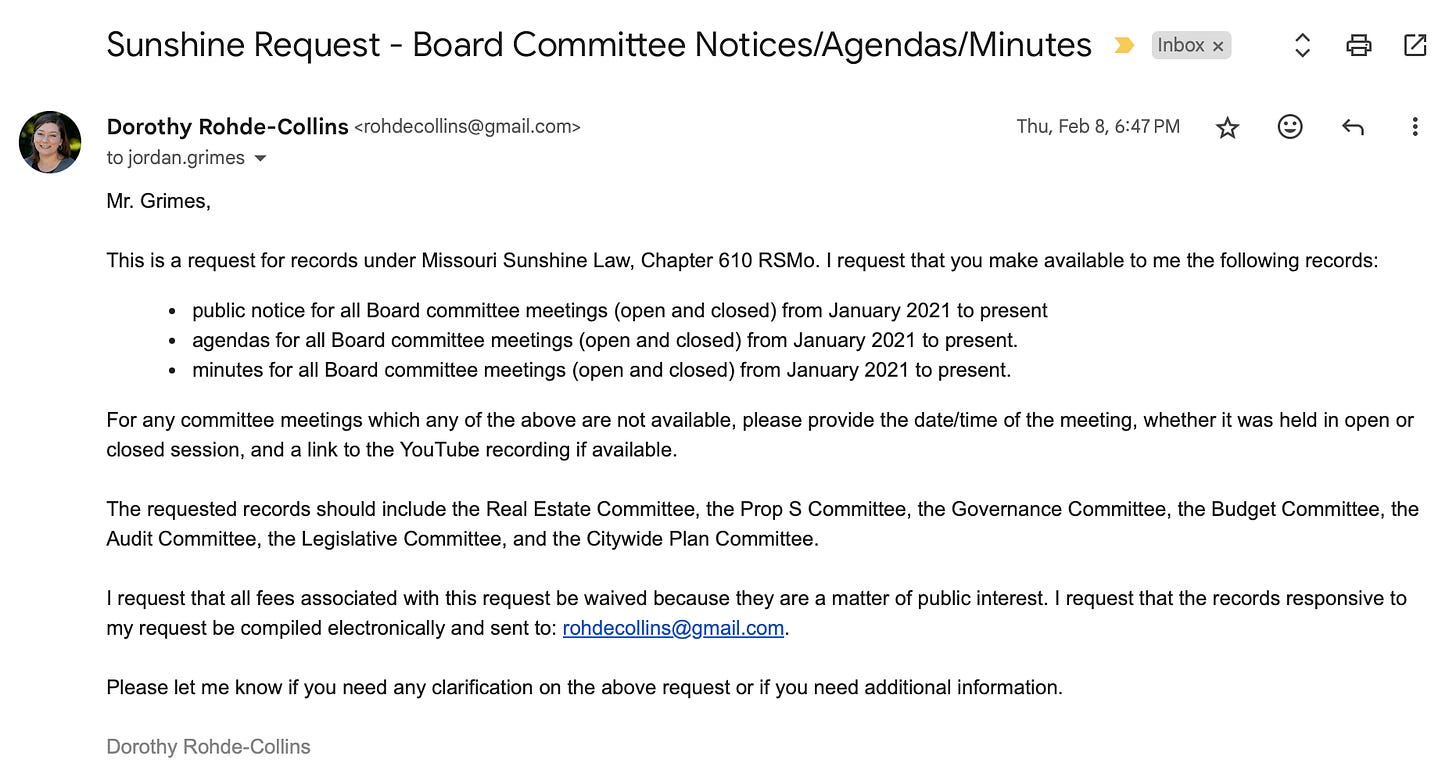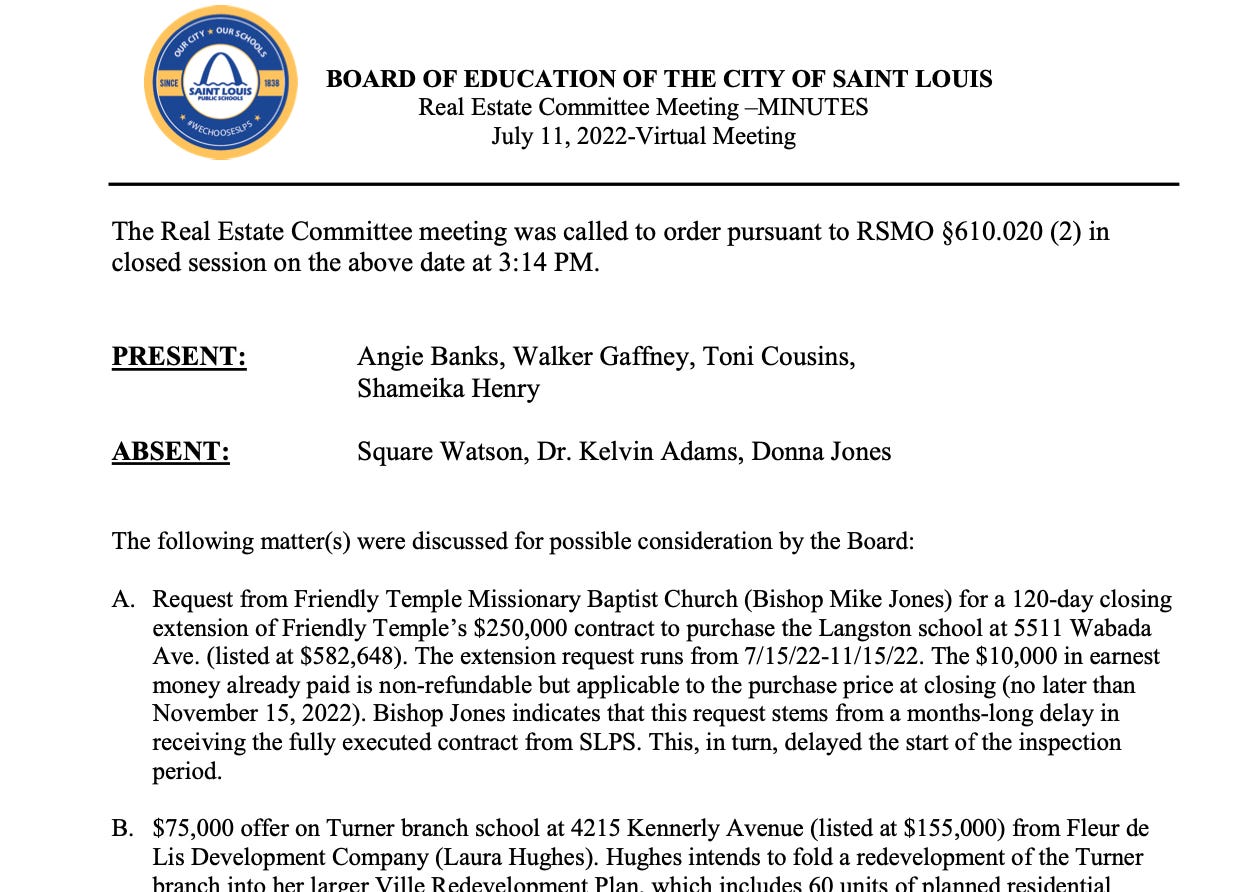Well, my months-long quest for SLPS committee records has finally come to an end. On Friday, the district provided some of the records I requested. I know that a simple requests for basic records seems straightforward, but there is a plot twist to this story. I’d encourage you to keep reading even if meeting minutes aren’t typically your thing.
As a reminder, this was my original request dated February 8, 2024. Please note that the request was for all committees including the Real Estate, Prop S, Governance, Budget, Audit, Legislative, and Citywide Plan and for all meetings, open and closed.
In March, I narrowed the date range to “May 2021 to present” after the district indicated it would require substantial research to go back to January 2021 since that pre-dates the current Board Secretary. They also quoted me an estimate of more than $1,300 to fulfill the request, including copying fees suggesting they expected more than 1,000 pages of records would be returned.
Note: To read all of the emails, please access my previous post on this topic.
So, let’s start with their final response:
Somehow the expected 1,000 pages of records became 23 pages of mostly blank minutes from only the real estate committee. No agendas or notice were included for the real estate committee and no documents were provided for any of the other committees. I’m not sure what I expected to see when I opened the attachment, but it wasn’t that.
As of the date of my Sunshine request, unredacted real estate meeting minutes had been posted up through November 2022. This makes the district’s choice to send me redacted minutes all the more interesting. In the PDF they provided, even the minutes they had previously posted were essentially blank. Here is a comparison using July 2022 based on screenshots I took on Friday afternoon.
As provided to me via the Sunshine request:
As available on the website Friday afternoon:
The district allocated staff time to redact minutes that anyone could read in their entirety on the website. This was surprising, but no, it isn’t the plot twist. Keep reading.
Given that it was Friday afternoon, I set this whole project aside for the weekend.
I sat down to write this post on Sunday afternoon planning to explain how the Sunshine Law only allows for specific records to be closed. In the case of real estate, only those matters about “Leasing, purchase or sale of real estate by a public governmental body where public knowledge of the transaction might adversely affect the legal consideration therefor” which is just lawyer-speak for affecting the price or contract terms. I had planned to show examples from the minutes on the website that did not meet the criteria for redaction, such as building use agreements and RFPs.
Except by now the website had been updated to include agenda and minutes for ALL meetings. I clicked on one expecting to see the redacted version and was shocked to see complete minutes. The district required staff to redact minutes including, in some cases, minutes that were already posted, only to post full minutes on the website anyway. While we could debate the why’s and how’s of this situation, I propose we take it as a win. Agendas and full, unredacted minutes of the real estate committee are now up-to-date and publicly available. Hopefully, the documents from other committees, the business meetings, and work sessions will soon follow.
There are some who question my motives in seeking these records, who wonder why I would bring attention to the district’s shortcomings at a time when it’s already under attack by others who seek to destroy it. This is inherent to leadership. Anytime I choose to enter the public discourse — whether that’s at a forum, in the newspaper, or on this substack — I invite in criticism and skepticism. I know my words wield power and influence. It is my goal to always use both responsibly and judiciously. However, the three years I served as President of the Board of Education prevent me from staying silent on matters that threaten to erode the moral and ethical fabric of St. Louis Public Schools.
The same criticism and skepticism directed toward me must also extend to the Board of Education, as they are the officials who are statutorily accountable to the public for their actions and decisions. Right now, they are subverting the democratic process by making it difficult for the public to access records and, in some cases, they may not be keeping records at all. Pressure works to hold elected officials accountable, but it will take all of us.
The democratic responsibility of school boards has been the through line of my political career. It’s a theme that shows up in my writing again and again and again. But it originated with what I lovingly refer to as my first political fight — the return to an elected school board after more than a decade under appointed control. In 2017, the SAB and school district devoted countless hours and thousands of dollars to garner community feedback, including a series of town halls to discuss three governance options - elected, appointed, and hybrid.
As I shared in my remarks advocating for a return to an elected board, “you can go to an appointed board meeting and you still are not hearing a dialogue around where your tax dollars are being spent, where the policies are coming from. None of that is happening. That will happen with an elected board because the people will demand it.”
Recommendations for Improvement:
Take advantage of the BoardDocs platform. Fully utilizing the capabilities of BoardDocs would eliminate the haphazard mess of webpages and links the district currently uses to post minutes and agendas. BoardDocs allows for documents and videos to be directly embedded into meeting materials, providing easy access to presentations, votes, and other information. This would facilitate a more transparent relationship with the public by providing one place to look for everything.
Donate more records to the public archives. I’ve mentioned previously that the St. Louis Public Library and Missouri History Museum and Archives house more than 100 years of SLPS documents, documents that are readily accessible to anyone who requests them. No permission from the Board of Education or district administrators is required. As an astute colleague pointed out to me, it should not be easier to obtain records from 1985 than it is those from 2023. SLPS should explore a partnership with these institutions to regularly archive school board and district documents. This would preserve the district’s history while reducing the burden on district staff to archive and retrieve records.
Get comfortable with scrutiny. If the school board wants to brag about being a fully democratically-elected board (and it should!) then it needs to act like one. But that requires a full commitment to transparency and accountability, even when it’s uncomfortable. Protecting the district’s image is a noble and worthwhile cause. However, if that protection comes with the added cost of making decisions in secret then that cost is too high to bear for it stands to cause more damage than honesty ever would.










